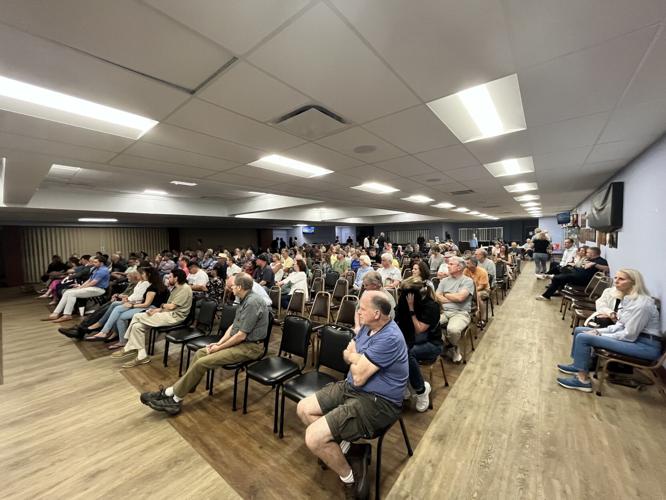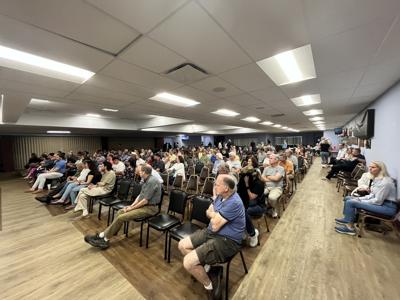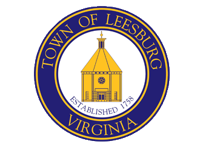Nearly 200 residents filled the banquet hall at the Lovettsville Fire and Rescue Station Wednesday night for a meeting hosted by the Lovettsville chapter of the Loudoun Transmission Line Alliance about the proposed transmission line by NextEra Energy expected to cut through the western part of the county to Leesburg.
The meeting was led by Alliance member Mary Terpak and included presentations by Piedmont Environmental Council Senior Land Use Planner Tia Earman, Waterford Foundation President Sue Manch and Scenic Loudoun Legal Defense representative Tom Donahue.
Earman’s presentation focused on the growing demand for power in region specifically from the increase in data centers and the lack of infrastructure to support it. Northern Virginia uses twice as much power as any other region in the world, she said.
“[There are] two aspects that are super important to understand in this conversation,” Earman said. “One, we do not have the power right now for the facilities that have already been approved. We don’t have it. Two, if the project is approved by a local government or a town, the power company is legally required to provide that power.”
Manch focused on the foundation’s work to unite the community with a common message after hosting a stakeholder’s meeting in February and founding the Alliance.
A preliminary planning corridor for the transmission line showed it going through the foundation’s Phillips Farm property that recently celebrated 20 years of preservation by the organization.
“We have a much better chance by approaching the project by being a united community against the project, not necessarily against data centers,” Manch told the audience. “We do want more regulation on data centers. We do want the government to think very carefully about where we go from here with data centers. And PEC and the LTLA decided to divide labor on this because there was so much to be done and it was so time sensitive. The LTLA is fighting this project. That's all we're talking about.”
Donahue said, in addition to the demand for power increasing, the issue is driven by effort to shut down coal-powered plants.

From left, Lovettsville Mayor Christopher Hornbaker, Supervisor Caleb A. Kershner (R-Catoctin), Waterford Foundation President Sue Manch Del. Geary Higgins (R-30), Scenic Loudoun Legal Defense representative Tom Donahue and Piedmont Environmental Council Senior Land Use Planner Tia Earman take questions from the audience during a meeting May 1, 2024.
“The net result of that is that there is what they see as congestion in the ability for power to flow from west to east,” he said.
His presentation focused on possible solutions that the community could propose instead of the original plan by NextEra to build new 500 kV lines to meet the power demand identified by regional power coordinator PJM Interconnection.
Those possible lines of argument include “just saying no” to the line, citing the environmental impact of the lines, undergrounding the lines, building new power stations such as small modular reactors, and aligning the new lines with current infrastructure such as other transmission lines or roadways.
Each of those strategies post significant challenges, Donahue said. The application by NextEra is submitted to the State Corporation for review and goes through a court-like process.
Using the first two lines of argument are not likely to be successful when faced with the evidence for power demand, he said. SMRs are significantly larger than expected and only produce enough power for single data centers while undergrounding drives the cost of the project up significantly.
“It has a substantial footprint on the ground,” Donahue said. “It's essentially equivalent to burying a big gas pipeline. And so, you need to be careful what you do with this. You need to think about what the impact would be on farming land.”
But the strategy that Donahue thinks is likely to have the greatest chance as succeeding is using a relatively new technology known as composite core conductors. Typically, transmission lines have steel in the center and aluminum on the outside. Alternatively, core composite conductors have carbon fiber in the center which makes them stronger, lighter and gives them better thermal properties so they don’t sag as much over time.
Those advanced lines, which can handle twice as much power, could replace current lines and be run on towers that already exist.
“It would be pretty much cost neutral,” he said. “I will spend less money doing the building of the lines, but I will spend more money on substations and I think it will just about even out. Same cost more power, no impact on the community.”

Western Loudoun residents line up to ask questions during a meeting about a proposed 500 kV transmission line expected to cut through western Loudoun May 1, 2024.
But this plan has its own challenges. Dominion Energy replaced its conductors less than 10 years ago, which means the company has not gotten its investment back from yet, he said.
Using new lines on current towers would also require close coordination between NextEra and Dominion as well and because the technology is new there are concerns about its feasibility.
“It hasn't been done at 500 kV in a big way here in the United States. In fact, it's only been done as a pilot by the Tennessee Valley Authority. … It's been deployed a lot at lower voltages but not the higher voltage. So, they're not comfortable and I appreciate that point,” Donahue said.
Lastly, there are security concerns about confining so much power to a single line.
“If it goes down, it’s like losing two lines,” he said.
Residents attending the meeting also had the opportunity to ask questions of Earman, Donahue and Manch as well as Supervisor Caleb A. Kershner (R-Catoctin), Del. Geary Higgins (R-30) and Lovettsville Mayor Christopher Hornbaker.
They voiced opposition to a recent resolution signed by the Board of Supervisors encouraging NextEra to use the existing rights-of-way for the proposed line.
“You were elected to represent the entire western Loudoun. You have taken a position to side with one group over another,” one resident told Kershner. “… You're pushing it on the current easement. That is my land.”
She said the building a new line where the current ones exist will widen the ROWs encroaching on even more of her and other community member’s properties.
“It is not going to be just a little easement. It is going to be an industrial easement when the rest of the lines come in. Why don't you try working with the rest of us and get this d—m thing underground? It can be done,” she said to applause.
Donahue said if the lines can be constructed on monopole towers instead of the lattice towers usually used for 500 kV lines which are taller but slimmer, it is unlikely that NextEra would need to widen the current ROWs.





























(7) comments
It's very simple. Northern VA Democrat members of the general assembly need to vote to repeal the Northam era law requiring VA to adhere to California's environmental laws. This has led to no gas powered electric generation plants being allowed to be built in VA. Power has to either be generated locally or imported from out of state coal plants. Virtue signaling is swell at cocktail parties, but gets pretty inconvenient in the real world.
Even easier - require data centers to be covered with solar panels. And quit bringing up partisan cultural points - it doesn't help and this is a bipartisan issue.
Much has been said about the misguided decision to allow by right data center development. However, there is another, similar, issue, namely that Dominion Energy is “required” to provide electrical service to locally authorized projects. Put these two things together and you have the current uncontrolled, exponentially growing demand for new power and transmission lines in northern Virginia. My suggestion is that large industrial power users should be treated differently than other categories of users. They should not automatically be guaranteed connection to the local grid. They should pay for new power generation facilities and other associated infrastructure without any subsidy from other user communities. We should be very skeptical that a new power transmission line is suddenly essential, and almost a fait accompli, because nobody saw this power crunch coming. What needs to happen is to expand natural gas generation as expeditiously as possible in the immediate area near the data centers. Moreover, the data centers should pay for it.
Agreed.
I also agree
All power lines should be underground! WHY - reduces risk of ionized radiation causing cancer in children. Do you need another reason? Is it really about carbon in the atmosphere or China or Trump or the views? Infrastructure adds value to the County both in potential job creation and property value. So why can't our elected officials see the common sense of it - underground?
Holding a cell phone to your head exposes you to WAY more ionizing radiation than any overhead line. However, I agree with undergrounding for other reasons.
Welcome to the discussion.
Log In
Keep it Clean. Please avoid obscene, vulgar, lewd, racist or sexually-oriented language.
PLEASE TURN OFF YOUR CAPS LOCK.
Don't Threaten. Threats of harming another person will not be tolerated.
Be Truthful. Don't knowingly lie about anyone or anything.
Be Nice. No racism, sexism or any sort of -ism that is degrading to another person.
Be Proactive. Use the 'Report' link on each comment to let us know of abusive posts.
Share with Us. We'd love to hear eyewitness accounts, the history behind an article.